Programme and Budget Committee - 16th session
The sixteenth session of the 27-nation Programme and Budget Committee (PBC) considered a range of issues related to the financial situation of UNIDO, including arrears. Agenda items also included transition to a single-currency system, financial regulations, the Report of the External Auditor covering the financial period 1998-1999, mobilization of financial resources and the medium-term programme framework 2002 - 2005.
| To read PDF files you need Adobe Acrobat Reader. To download it, please click on the icon. |  |
- PBC.16/1 - Provisional agenda (9 KB/1 page)
- PBC.16/1/Add.1 - Annotated provisional agenda (21 KB/3 pages)
- PBC.16/2 - Annual Report 1999 (985 KB/124 pages)
- PBC.16/2/Add.1 - Annual Report 1999, Programme Performance Report and List of technical cooperation activities (2,545 KB/60 pages)
- PBC.16/2/Corr.1 - Annual Report 1999 (124 KB/3 pages)
- PBC.16/3 - Conversion of the 2000-2001 programme and budgets into euros for comparison purposes (25 KB/4 pages)
- PBC.16/4 - Report of the External Auditor for the financial period 1998-1999 ended 31 December 1999 (1,053 KB/70 pages)
- PBC.16/4/Corr.1 - Report of the External Auditor for the financial period 1998-1999 ended 31 December 1999 (19 KB/1 page)
- PBC.16/5 - Medium-term programme framework, 2002-2005 (20 KB/3 pages)
- PBC.16/6 - Mobilization of financial resources. Unutilized balances of appropriations, 1991-1993 and 1996-1997 (25 KB/4 pages)
- PBC.16/7 - Financial performance report for the biennium 1998-1999 (70 KB/9 pages)
- PBC.16/8 - Comments of the Director-General on the report of the External Auditor (19 KB/3 pages)
- PBC.16/8/Corr.1 - Comments of the Director-General on the report of the External Auditor (12 KB/1 page)
- PBC.16/9 - Changes in the definition of major objects of expenditure (23 KB/3 pages)
- PBC.16/10 - Financial Regulations (18 KB/2 pages)
- IDB.23/2 - Report of the Programme and Budget Committe on the work of its 16th Session (PDF: 33 KB)
4 September 2000
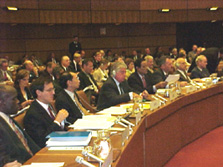
The Programme and Budget Committee at session.
" I am confident, and I have to believe, that the magnitude of our success in transforming the Organization and refocusing its services to fulfill the mandate of the Business Plan will generate a strong and renewed commitment from Member States - financial as well as political," said UNIDO Director-General Carlos Magariños. He was addressing the opening of the sixteenth session of the 27-nation Programme and Budget Committee (PBC), which is considering a range of issues related to the financial situation of UNIDO, including arrears. Agenda items also include transition to a single-currency system, financial regulations, Report of the External Auditor covering the financial period 1998-1999, mobilization of financial resources and the medium-term programme framework 2002 - 2005.
Calling for timely payment of assessed contributions and an increase in voluntary contributions, Carlos Magariños said that
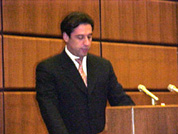
"Reforms cannot succeed or show results without the necessary investment by the stakeholders," said UNIDO Director-General Carlos Magariños.
"reforms cannot succeed or show results without the necessary investment by the stakeholders." In this context, he pointed out that in all his statements since April 1998, he has been calling the attention of Member States to the level of resources required to complete and implement the reforms. "However, there is still an important gap between the trend of collections and the needs of our portfolio of programmes," he said. Recalling Member States' statements evaluating UNIDO as a model organization that has taken the lead in transforming and refocusing its activities within the UN system, Carlos Magariños stressed that more funds were needed for the programmes of UNIDO, the Organization with a mandate to protect the environment, reduce poverty and create a better life for three quarters of the earth's population.
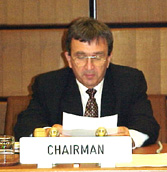
H.E. Mr. Alojz Nemethy, Permanent Representative of Slovakia to UNIDO and outgoing PBC Chairman.
Opening the session, H.E. Mr. Alojz Nemethy, Permanent Representative of Slovakia to UNIDO and outgoing PBC Chairman, expressed his gratitude to Member States and UNIDO for their cooperation during his tenure of office. In his statement, Mr. Nemethy stressed three issues, which in his view were of greatest importance for the newly reformed UNIDO, namely, strengthening cooperation in implementation of various programmes with the UN Development Programme, tightening contacts with Member States and calling on Member States to pay their assessed contributions in time.
H.E. R.O. Mowoe, Permanent Secretary of the Federal Ministry of Industries in Nigeria, was elected the Chairman of the sixteenth session.
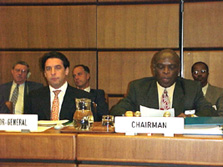
H.E. R.O. Mowoe, Permanent Secretary of the Federal Ministry of Industries in Nigeria addressing the session.
Thanking Member States for his election, Mr. Mowoe said that he has closely observed the work of UNIDO from his capital. "There are many items on the agenda that call for the wise guidance of the Member States who are Members of the Committee. But that does not exclude the other Member States of the Organization whose valuable inputs will also be respected and most welcome." H.E. Mr. Nobuyasu Abe, Permanent Representative of Japan to UNIDO, H.E. M. Petrizio Palacios Cevallos, Permanent Representative of Ecuador to UNIDO and H.E. Mr. Alojz Nemethy, Permanent Representative of Slovakia to UNIDO were elected Vice-Chairmen. Mr. M.S. Srinivasan, Joint Secretary of the Ministry of Industry of India, was elected as the Rapporteur of the session.
Statements followed in line with the agenda items:
 Item 4: Financial situation of UNIDO, including arrears. Statements were made by the representatives of Nigeria (on behalf of the African Group), Ecuador (on behalf of GRULAC), Hungary, France (on behalf of the European Union, Bulgaria, Cyprus, Hungary, Malta, Poland, Romania, Slovakia, Slovenia, Czech Republic and Turkey), Uruguay (on behalf of the Group of 77 and China), Sudan, Japan, Russian Federation, Algeria, Philippines and China.
Item 4: Financial situation of UNIDO, including arrears. Statements were made by the representatives of Nigeria (on behalf of the African Group), Ecuador (on behalf of GRULAC), Hungary, France (on behalf of the European Union, Bulgaria, Cyprus, Hungary, Malta, Poland, Romania, Slovakia, Slovenia, Czech Republic and Turkey), Uruguay (on behalf of the Group of 77 and China), Sudan, Japan, Russian Federation, Algeria, Philippines and China.
 Item 7: Transition to a single-currency system. Statements were made by the representatives of Uruguay (on behalf of the Group of 77 and China), Nigeria (on behalf of the African Group) and Austria.
Item 7: Transition to a single-currency system. Statements were made by the representatives of Uruguay (on behalf of the Group of 77 and China), Nigeria (on behalf of the African Group) and Austria.
 Item 3: Report of the External Auditor, financial pefromance report and programme performance report for the biennium 1998-1999. The item was introduced by the External Auditor. Statements were made by the representatives of Uruguay (on behalf of the Group of 77 and China), France (on behalf of the European Union, Bulgaria, Cyprus, Hungary, Malta, Poland, Romania, Slovakia, Slovenia, Czech Republic and Turkey), Nigeria (on behalf of the African Group), China, India and Turkey. The Director-General and a representative of the Secretariat also took floor.
Item 3: Report of the External Auditor, financial pefromance report and programme performance report for the biennium 1998-1999. The item was introduced by the External Auditor. Statements were made by the representatives of Uruguay (on behalf of the Group of 77 and China), France (on behalf of the European Union, Bulgaria, Cyprus, Hungary, Malta, Poland, Romania, Slovakia, Slovenia, Czech Republic and Turkey), Nigeria (on behalf of the African Group), China, India and Turkey. The Director-General and a representative of the Secretariat also took floor.
 Item 6: Financial regulations. Statements were made by the representatives of Austria and Uruguay (on behalf of the Group of 77 and China).
Item 6: Financial regulations. Statements were made by the representatives of Austria and Uruguay (on behalf of the Group of 77 and China).
 Item 5: Unutilized balances of appropriations, 1992-1993 and 1996-1997 and Item 9: Mobilization of financial resources. Statements were made by the representatives Uruguay (on behalf of the Group of 77 and China), Nigeria (on behalf of the African Group) and Cote d'Ivoire.
Item 5: Unutilized balances of appropriations, 1992-1993 and 1996-1997 and Item 9: Mobilization of financial resources. Statements were made by the representatives Uruguay (on behalf of the Group of 77 and China), Nigeria (on behalf of the African Group) and Cote d'Ivoire.
 Item 8: Medium-term programme framework, 2002-2005. Statements were made by the representatives of Uruguay (on behalf of the Group of 77 and China), Nigeria (on behalf of the African Group), Republic of Korea, Sudan and Democratic People's Republic of Korea. The Director-General also made a statement.
Item 8: Medium-term programme framework, 2002-2005. Statements were made by the representatives of Uruguay (on behalf of the Group of 77 and China), Nigeria (on behalf of the African Group), Republic of Korea, Sudan and Democratic People's Republic of Korea. The Director-General also made a statement.

5 September 2000
The Programme and Budget Committee invited the Director-General to conduct consultations with Member States before scaling down the integrated programmes and to identify a course of action to bring about effective decentralization so that the results could be reviewed at the forthcoming session of the Industrial Development Board, to be held in November 2000. With regard to the financial regulations, Member States encouraged the Intersessional working group to continue its deliberations with a view to submitting proposed amendments to the financial regulations to the seventeenth session of the PBC to be held next year. The Committee took note of the report of the External Auditor for the Biennium 1998-1999 and the note of the comments of the Director-General.
The conclusion on transition to a single-currency system included, among others, provision for conversion of the 82 per cent of Austrian schilling portion of the regular budget for 2000-2001 into euros by applying the fixed exchange rate of 1 euro= ATS13.7603, as well as the conversion of the 18 per cent dollar portion of the 2000-2001 regular budget into euros by using the January to December 2000 average UN euro/dollar exchange rate for the purpose of ensuring a realistic comparison with the regular budgets of future periods.
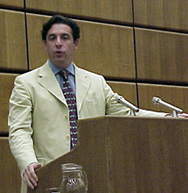
UNIDO Director-General Carlos Magariños concluding the session.
Concluding the sixteenth session of the Programme and Budget Committee, UNIDO Director-General Carlos Magariños urged Member States to assist UNIDO, in particular in financial terms, to move ahead with the many solid programmes and initiatives stemming from Member States' requests expressed in the Business Plan on the Future Role and Functions of UNIDO, which was endorsed by Member States at the seventh session of the UNIDO General Conference held in December 1997.
"Although the overall concept of integrated programmes was initiated by Member States, results to date in terms of funding made available are considerably less than had been anticipated," said Director-General. He noted that, in line with the Business Plan, structural and programmatic reforms have stabilized the Organization, which then commenced the development of comprehensive packages of integrated services and new technical cooperation initiatives. "All these changes were evaluated by the independent report of the External Auditor for the biennium 1998-1999, which has been under discussion during this session," he said.
Pointing out the unique expertise of UNIDO staff in many technical fields and prospects for future recruitment of new human resources, who could strengthen the Organization by 2001, the Director-General said "your guidance on what level of resources UNIDO could rely upon is absolutely necessary to plan how much technical cooperation UNIDO should do." In this context, he also brought the attention of Member States to a strategy for effective decentralization of activities and a strengthened field representation. A decentralized system will move UNIDO closer to its clients and to the other development actors in the field. With adequate powers, the field offices would be able to respond to challenges quickly and help increase the development effectiveness of all its activities.
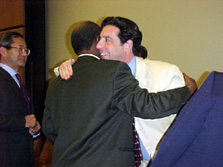
Carlos Magariños thanks H.E. R.O. Mowoe, Permanent Secretary of the Federal Ministry of Industries in Nigeria for chairing the session.
Thanking Member States for their valuable statements, he expressed his confidence that with timely payment of assessed contributions UNIDO could mobilize resources to increase its technical cooperation and implement more national and regional programmes, as well as proceed with new initiatives such as services related to the environment, private sector development and the Technology Foresight Programme."
H.E. R.O. Mowoe, Permanent Secretary of the Federal Ministry of Industries in Nigeria and Chairman of the sixteenth session of the PBC, expressed his gratitude to all Members for their support during the session. Wishing UNIDO prosperous future, he encouraged Member States to pay their assessed contribution and arrears in time to enable UNIDO to move forward with its programmes and new initiatives.


